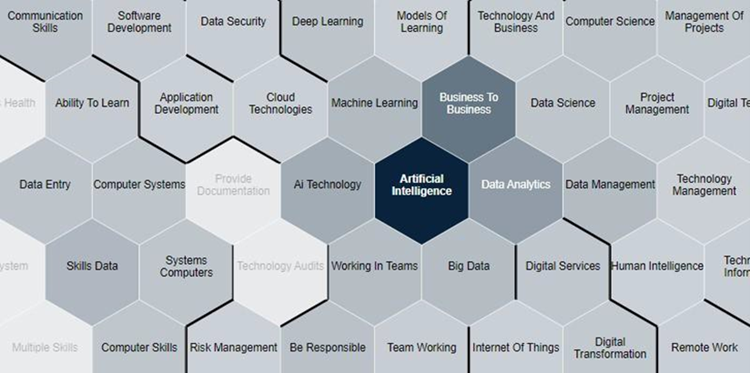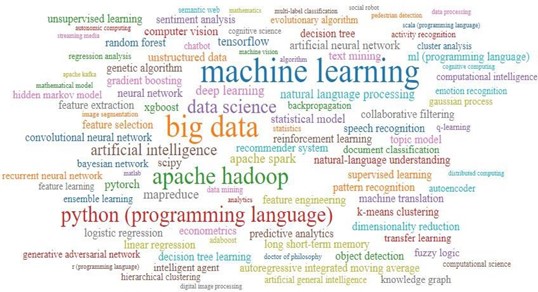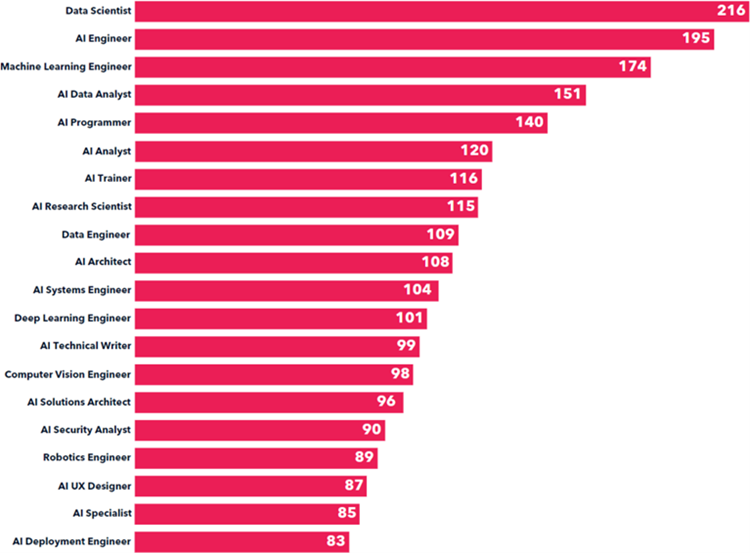
 Back
Back
The Most Needed AI Skills and Roles in Europe
The exponential growth in Artificial Intelligence (AI) leads to an unfolding need for AI skills, which cannot be met by existing learning programmes. New AI job roles are being created across all sectors as AI is not just the domain of technologists. Senior managers in industry, government officials, policymakers, and society in general need to understand how AI functions.
With its AI Skills Needs Analysis Report, ARISA uncovers the critical gaps between the current and future AI skills demand and the provision of AI learning offerings. From industry questionnaires and job vacancies analysis to expert focus groups and desk research, this methodical approach provides an in-depth understanding of the gaps between demand and supply for AI skills and roles across Europe.
Key Findings from the AI Skills Needs Analysis
Industry Questionnaire


To understand the needs of the market, we surveyed more than 400 people from SMEs (21%) to big companies (79%). The technology, education, financial services, manufacturing and telecommunications sectors accounted for a large proportion of the responses with some respondents indicating that they are operating across multiple sectors. Research and development, new product development, operations and customer services were identified as the most frequent areas where AI is utilised.
The results from the questionnaire, aimed at industry players, show that Data and machine engineers are highly sought after. And interestingly, new roles like AI Data Product Manager, AI Strategist and AI Ethical Officer amongst others are now actively required. Among AI non-technical roles, AI project managers, product managers and business managers are in the highest demand.
This, coupled with the requirement for individuals to possess the ability to understand the business opportunity around AI, regulation and compliance for AI, merged with transversal skills like problem-solving, and critical and strategic thinking were highlighted.
Finally, from a training and education viewpoint, micro-credentials seem to be a key enabler for bite-size learning, with hybrid/online training gaining traction.
Job Vacancy Analysis
By using an AI-powered tool, 756,076 job advertisements within the EU were analysed, resulting in 2,563 AI-related jobs being identified. The skills were grouped into five categories: AI general skills, Big Data and Analytics, Machine and Deep Learning, Cyber and Data security and Large Language Models.
As AI is a combination of skills rather than just a single skillset, programming languages like Java, JavaScript, Python and C++ remain in high demand. This chart provides an overview of general AI skills:

Big Data and Data Analytics are still key components of AI but more in the realm of the business of AI. Machine Learning and Deep Learning are connected to all aspects of AI and it is recognised that it is impossible to understand AI without understanding Machine Learning. With all technologies Cyber and Data security have now become an integral part of the fusion of technologies. Key to AI is the understanding of how Cyber and Data security is knowledge sets that practitioners must possess.

Large Language Models (LLM) and the crossover into generative AI are the future. Skills requirements for LLM and Natural Language Processing (NLP) are fast moving and an agile learning approach to these topics will be required.
Expert Focus Groups


In our two Expert Focus Groups — one with policymakers and one with experts from organisations — we identified options to close the AI skills gaps, accelerate industry-to-academic collaboration and deployment of sector-specific initiatives.
“All policymakers at the EU level should have at least a basic understanding of the potential and risks of AI to support their legislative efforts.” – Focus Group expert
The necessity to urgently gain knowledge about AI and its terminology for policymakers is critical. They will be at the forefront of shaping AI legislation, investment, and both labour and industry policies.
Policymakers require AI skills to make informed decisions and rather than technical AI skills, they need competencies in ethical, legal, and regulatory skills — amongst others — to inform government policy. In time, this trend could lead to the emergence of specialised roles like AI ethical advisors, AI legal experts, and as we have already seen in some EU member states the role of AI ambassadors to the national governments.
Among experts from organisations, it was clear that the beyond the need for skills, organisational culture and the skills to shape it are critical to any embracement and alignment of AI within an organisation.
“AI practitioners need skills- such as understanding business processes, ability to present and sell a product, customer relations, conflict management.” – Focus Group expert
Data Science, Data Engineering and Machine Learning skills figured predominately with data visualisation, natural language processing and robotics less so on the technical side. Strong recommendations included the necessity for soft and business-related skills.
Desk research
From the review of professional and scientific articles on AI roles within organisations to the identification of national and European AI initiatives, the desk research helped to deepen our understanding of the demand and supply of AI skills.
On the demand side, six clusters of AI skills, which in turn map to AI roles, were identified, namely Natural language processing, Computer vision, Robotics, Machine learning, Neural or deep learning networks, and Data. Link to that, we can refer to the 2023 OECD AI Policy Observatory’s skills Word Cloud which shows an overarching reliance on a broader range of skills for any AI role.

On the supply side, we identified existing learning programmes by educational institutions across the EU including type and level of the programmes, delivery models and duration. Current programmes teach a mixture of standard machine learning and AI skills coupled with newer skills like deep learning. These are reflective of the skills required for roles like a data scientist, AI and machine learning engineer. However, new areas like AI UX design were mentioned too as the majority of learning programmes do not focus on a single role but broader AI skills and competencies. Higher education institutions provide the most programmes followed by Vocational Education and Training. Within this, classroom-based delivery was the most popular learning format followed by blended and then distant learning.
The following is a list of AI roles targeted by learning programmes identified during the desk research:

What was identified was the lack of AI skills programmes for policymakers and decision-makers It is necessary to identify a more robust skills profile for AI professionals including soft skills. All programmes will need to be agile and modular to facilitate fast-paced delivery and change as the AI landscape is developing very quickly.
Next steps
The AI Skills Needs Analysis is a starting point to design a coherent AI Skills Strategy for Europe with skills intelligence on the current and future skills demand in the field of AI. It will also feed the development of the AI Skills Strategy with information on the current and future demand for AI roles and information on the current supply of AI learning offerings.
ARISA will use the conclusions from the Needs Analysis to address the identified skills gaps and develop learning programmes to address those urgent needs.

Other interesting news

ARISA launches the AI Skills Strategy for Europe
23 January 2024
Press Release • ARISA has unveiled an innovative strategy aimed at addressing this surging demand and mitigating the skills gaps and mismatches in the AI landscape across Europe.

ARISA Newsletter: February 2024
29 February 2024
How to position Europe at the forefront of AI development? Addressing the growing demand for AI skills is crucial. Our recently published AI Skills Strategy for Europe presents concrete solutions to bridge the AI skills gap, retain talent and ensure diversification of AI profiles.

Towards a well-rounded AI Skills Strategy for Europe
11 January 2023
The AI Skills Needs Analysis is the foundation of the upcoming Artificial Intelligence Skills Strategy for Europe.